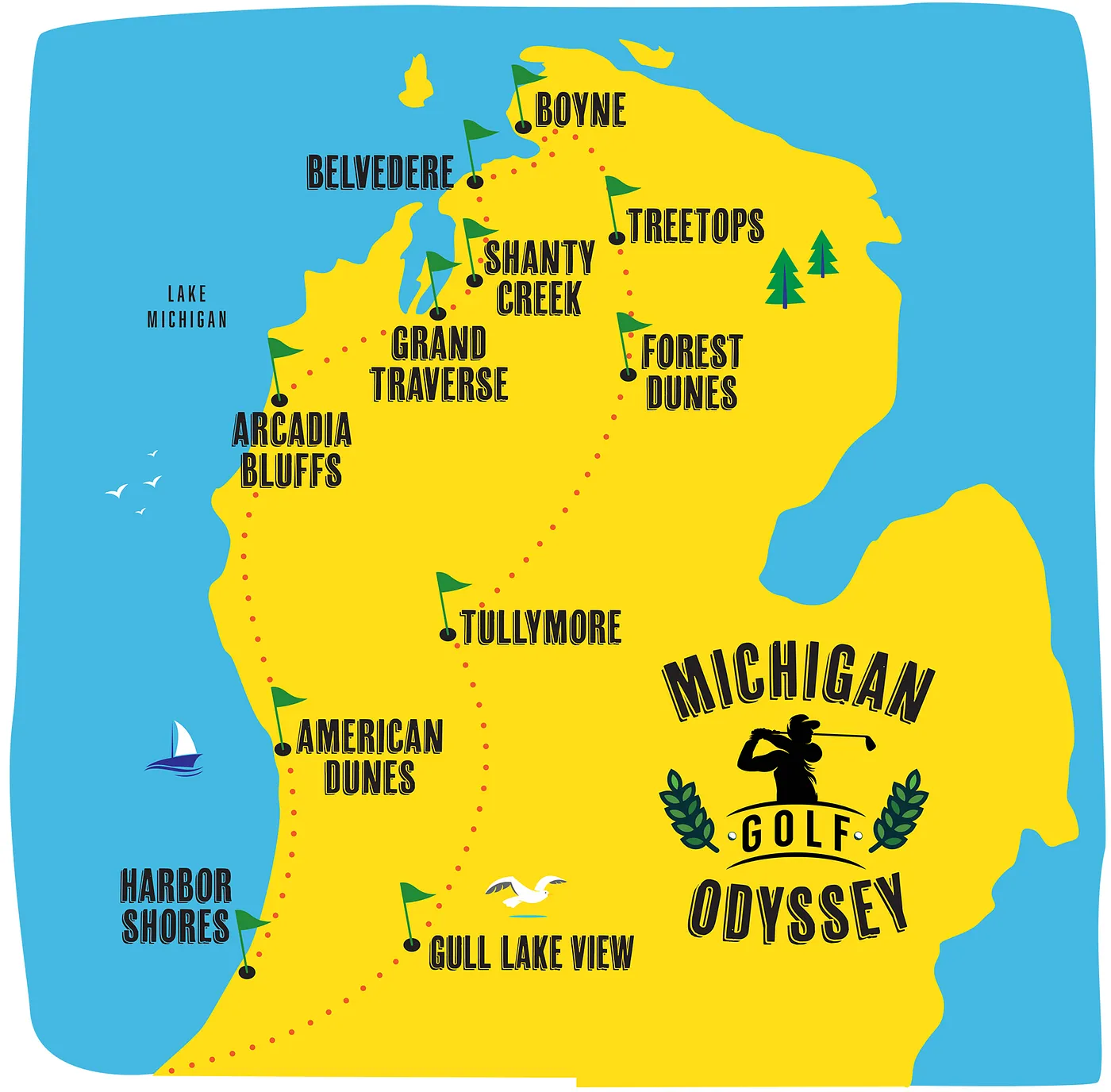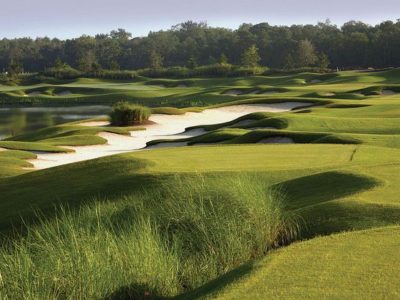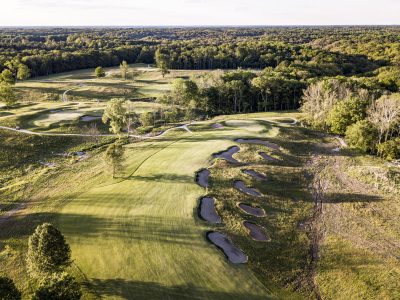By Barry Cronin, Editor Chicago District Golfer
Part 1 of a 3-part series on Michigan Golf Resorts.
Part 1:
Michigan is the land of Ford, GM, Chrysler, the UAW, Diana Ross, Stevie Wonder, Bob Seger, Eminen, the Lions, Tigers, Red Wings and the hapless Pistons. Michigan is also known for its pleasant summer weather that is paired perfectly with 20 of the “Best Courses You Can Play” as rated by Golfweek. The Mitten State finished tied for runner-up with California, behind only Wisconsin, in a recent Golf Digest ranking of the “Best States For Public Golf Courses.”
This entire Michigan Golf Odyssey took eight days, covered more than 800 miles with 153 holes of some of the finest golf imaginable and best of all did not require schlepping golf clubs through an airport.
The first stop was Gull Lake View Resort, a fourth-generation family-owned resort located near Kalamazoo. Gull Lake View has a total of six courses, with the most intriguing being, Stoatin Brae, Gaelic for ‘Grand Hill.’ Tom Doak’s Renaissance Golf Design team crafted this ‘American Links’ style course in 2017 and course raters for the national golf magazines swooned.
As its name suggests, the course sits on one of the highest points in Kalamazoo County. It’s a rugged, mostly tree-free landscape with roller coaster greens and plenty of wind. The other five courses are no slouches either, but a bit more traditional, parkland-style, perfect for outings and golfers of various skills. If the word “resort” conjures visions of valet parking, turn-down service, pillow mints and “welcome” goodie bags, be forewarned: Gull Lake View is not that, catering to mostly the “guys trip” demographic with everything-you-need-and-nothing-you-don’t lodging, comfortable beds, refrigerators, microwaves, big screens and indestructible furniture. Go to dinner in bustling Kalamazoo, home of Western Michigan University, as well breweries, such as Bell’s, which has its own restaurant.
Gull Lake View Resort might not be the ideal honeymoon getaway, but if moderately priced golf within a reasonable driving distance of Chicago is what you crave, it’s perfect.About an hour north of Gull Lake
View lies Tullymore Golf Resort, which features two fine courses, Tullymore and St. Ives. The former was named Best New Upscale Course in 2002 thanks to architect Jim Engh’s innovative bunkering and unique green design, plus the accommodations were first-rate.
The single golfer never knows where his next partners will be coming from, which adds interest. At world-class Forest Dunes Resort in Roscommon, deep in central Michigan’s Huron National Forest and two hours north of Tullymore, I joined a threesome that was making its way through Michigan playing elite private and public courses. Naturally, Forest Dunes, with two courses included among Golfweek’s Top 100 You Can Play, was on their list. They’d come to play Tom Weiskopf’s parkland-style Forest Dunes course (2002) and Tom Doak’s reversible The Loop (2017), a mind boggling two courses in one.
Weiskopf’s traditional course features bentgrass tees, greens and fairways. It plays through gorgeous Michigan pines on the front nine and opens up on the back nine that features Weiskopf’s signature short par 4 No. 17 and a 560-yard par-5 finishing hole along a lake. Challenging, beautiful and deserving of its ranking.
The Loop makes one understand why Doak’s fertile imagination has made him one of this generation’s more important course architects. I mean, who thinks this way? Standing on a green at The Loop and looking back to the tee box, you inevitably see a gaping moon-surface bunker facing you. Why? It’s tomorrow’s fairway bunker, the one you’ll be trying to avoid off the tee when you play the hole in the opposite direction.
The Loop features fescue grass fairways that’ll have your ball running in the determined Scottish manner it’s designed to mimic. Hopefully, your ball will stop short of the native plant areas that tightly border the fairways (lost ball alert!). Large undulating greens await with many hole location options to confound the would-be two-putter. Wrap up the day at the 10-hole Bootlegger course, a dynamic pitch-and-putt designed by Riley Jahns and Keith Rebb.
By the way, my other three players at the Loop Black course were a member of Augusta National, a former U.S. Open contestant and a third dude who was more of an average golfer, like yours truly. He and I helped one another find our occasional errant shots while the other cart sped to the green.
Because The Loop is an every-other-day experience, you have to spend at least one night. The good news is the accommodations and dining are first class, but there are only 131rooms currently available. New owners of Forest Dunes have committed to add more lodging and are also planning another golf course, possibly a Gil Hanse design.
Although it is somewhat remote, Forest Dunes is a treasure. It is a pure golf resort without a swimming pool, spa or other resort amenities. Just golf, golf and more golf. Sublime golf at that.
Part 2:
Forest Dunes was my last stop in Part 1. Heading about 90 miles farther north through Michigan’s tall pines and forgotten small towns sits the granddaddy of all the great Michigan golf resorts, BOYNE. It’s welcoming halo extends across the state with 10 Magnificent Courses and is the biggest resort in the state.
BOYNE was originally a haven for skiers, but over the last half-century it has evolved. Today, in addition to being a premier winter destination, it now owns 10 golf courses, known collectively as Boyne Golf, that serve golfers of all levels from the single digit handicapper to beginners and “infrequents” who pick up their clubs strictly while on vacation.
In 1966, BOYNE founder Everett Kircher hired Robert Trent Jones, Sr. to design the resort’s first course, The Heather, to provide a summer activity for guests and to keep his work force busy, once the ski season ended. The Heather turned out so well, it was recognized by Golf Digest and Golf magazines for its excellence. In 2019, the Heather was recognized as the ‘Course of the Year’ by the National Golf Course Owner’s Association.
Over the years, Kircher and his successors continued to build and acquire more courses. In addition to The Heather, golf aficionados will appreciate The Hills, the Donald Ross Memorial and the ridiculously spectacular 27 holes at the Bay Harbor Club, which plays along Lake Michigan and Little Traverse Bay. You can say the views at Bay Harbor are breathtaking, magnificent and awe-inspiring, but all would be an understatement.
Something new for 2024, a nine-hole short course, Doon Brae, plus a Himalayas-style putting green are under construction near the Main Lodge at The Highlands location and will open for play later this summer.
BOYNE has the resort thing down and can easily handle family vacations, couple’s escapes, buddy’s trips and girl’s getaways. Rooms feature uber-comfortable beds made especially for the resort by a manufacturer near Detroit.
The 15-year veteran omelet cook in the restaurant at the Main Lodge worked with the speed, efficiency and quality of Tom Brady diagnosing an opposing defense.
Plus, there is plenty to do beyond golf at BOYNE. Do we really need to play 36 a day?
Forget about your three-putts with a walk on the new Skybridge Michigan, the world’s longest timber-towered suspension bridge overlooking Boyne Mountain and environs. BOYNE also has multiple spas at Boyne Mountain and Bay Harbor, as well as The Highlands.
There is also a Zipline Adventure, chairlift rides and fishing, as well as hiking and biking.
If you enjoy five-star accommodations, book a room at Chalet Edelweiss; you’ll think you’re at the Four Seasons. Want to hit the local community? A 10-minute drive takes you to the sparkling waterfront resort village of Harbor Springs, where art galleries, restaurants, fudge shops and clothing retailers conspire to make you wonder why you don’t stay all year.
After spending time at BOYNE Resort I didn’t think my trip could get any better, but there is so much wonderful golf in Michigan to completely sate an golfing appetite.
A short 40-minute drive from Boyne to Charlevoix brings you to the historic Belvedere Golf Club. Designed in 1923 by storied architect William Watson, Belvedere is the course that has definitely survived the test of time and a who’s who among golf’s great champions have played.
A young Tom Watson honed his skills at Belvedere while on summer family vacations. Watson and his father played their final round together here. I was told that Tom Watson had come to play the course by himself, just three weeks before my visit and he still has a locker in the members’ clubhouse.
Belvedere’s signature hole is № 16 and the assistant pro told me an interesting story. When Ken Venturi was playing a Senior PGA Tour event in Traverse City in the early 1990’s, he came into the tiny white clapboard pro shop and announced that a friend had told him he just had to see the 16th hole, a classic short par 4. “Who’s your friend?” the head pro asked. “Gene Sarazen,” Venturi replied. He was promptly taken to № 16.
Belvedere is a private club, but non-members are allowed to play. Contact head pro Marty Joy, who helped oversee Bruce Hepner’s 2017 course renovation after William Watson’s long lost original plans were discovered in a building in Charlevoix prior to its demolition. He also maintains the small shop that is more like a museum of the Hall of Fame golfers that have played at Belvedere.
Part 3:
Last Leg: Heading Back South
Two hours south of Belvedere sits Arcadia Bluffs, home of two fantastic and completely opposite style courses. The Bluffs Course, ranked 64th on Golfweek’s Top 200 Modern Courses built after 1960, is links-style built adjacent to Lake Michigan. A little over one mile away lies the South Course, an architectural homage to Chicago Golf Club. The fact that these two courses co-exist at the same resort is reason enough for a visit.
The Bluffs features wide, rolling fairways, spacious and challenging greens and deep bunkers strategically placed in fairways and around greens. Being on a sand bluff high above Lake Michigan, the winds are normally an issue. The views from the holes that play along the elevated sand bluffs over Lake Michigan are more than worth the price of the green fees. If you play in the late afternoon, the sunsets over the lake, along with the bagpiper make for a perfect round of golf.
While the Bluffs has spectacular views of Lake Michigan, the South Course gives players a look backward into the creative imaginations of Chicago Golf Club designers C.B. Macdonald and Seth Raynor, whose genius of the 1890s continues to inspire today’s golf course architects, especially South Course designers Dana Fry and Jason Straka. Built on farmland, the South, like Chicago Golf, is flat compared to its sister course, The Bluffs. There are no trees or water hazards. Wide fairways and huge greens make the course look easy on first glance, be warned, it isn’t. Thoughtful players are asked to make strategic decisions starting from the tee all the way to highly contoured greens.
The brilliant white Nantucket-style clubhouse and veranda at the Bluffs course is the perfect place to catch a Lake Michigan sunset. On-site accommodations include, the Lodge and the Cottages, both of the highest quality, as are the formal dining room and menu options.
Harbor Shores
A little over three hours south of Arcadia Bluffs we made the last stop at Harbor Shores Resort in Benton Harbor. It’s the home of a Jack Nicklaus Signature course, which will host the KitchenAid Senior PGA Championship for the seventh time this month.
The course meanders through inland terrain on holes 1–6 and the dunes on 7–9, where Lake Michigan vistas appear. Holes 10–13 feature rolling hills, ravines and a hardwood forest, while holes 14–18 play along the Paw Paw River and various wetlands.
The course is the shining star of the massive revitalization of the Benton Harbor/St. Joseph community led by Whirlpool, a company that was founded in Benton Harbor in 1911. More than 13 years ago, Whirlpool took its corporate citizenship commitment to another level, working with the two cities and other stakeholders to realize their vision of using a golf venue to revitalize the area.
More than three-million square feet of dilapidated buildings were demolished and 140,000 tons of waste material — some of it toxic — were removed. The end result, a championship-caliber golf course, the comfortable Inn at Harbor Shores, real estate opportunities and even a high-rise condo building. But beyond all the good feelings of the revitalization project, Harbor Shores is a golf course worth playing.
A little further south sits American Dunes, a dramatic Nicklaus renovation, associated with the Folds of Honor charity. It is a relatively new renovation and has helped draw thousands of golfers to the Southwest Michigan coastline.
So Many Courses and So Little Time….
There are simply too many great golfing opportunities in Michigan. Other outstanding resorts that I did not have ample time to visit include, the 81 holes of golf at Treetops Resort, plus the additional 11 championship courses in the Gaylord Golf Mecca. Shanty Creek has 90 holes of golf, including Arnold Palmer’s The Legend. Grand Traverse Resort has three wonderful 18-hole championship courses and Crystal Mountain has two challenging courses that have been recently renovated.
It is hard to imagine any other spot on earth with so many quality golf courses open for public play. Michigan is awash with superb golfing opportunities for every golfer.
“Michigan resort golf is terrific and well worth the drive.”
Reprinted with permission from Barry Cronin and Chicago District Golfer.










